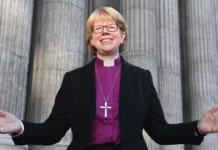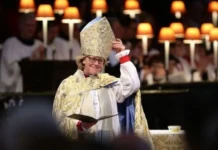In my previous article on this site I responded to Charlie Bell’s article ‘Finding a way through’ by explaining that the proposal put forward by the Church of England Evangelical Council and the wider Alliance movement for a provincial solution to the current divisions over marriage and sexual ethics in the Church of England is not contrary to Anglican ecclesiology and would allow both liberals and conservatives in the Church of England to get what they want. Given that this is the case, I finished my post by asking why this proposal is considered problematic by Bell and others on the liberal side.
Bell’s response to my article was to post the following on X:
‘Au contraire, Mr Davie. The position you set out here in both unachievable within Anglican ecclesiology (hello geographical nature of the episcopate) and this demonstrable nonsense as a starting point. Folks, you gotta do better than this.’
If we set aside the unsubstantiated claim that what I wrote was ‘demonstrable nonsense’ what we find is that Bell’s objection to the provincial proposal is that it is out of line with Anglican ecclesiology because of the ‘geographical nature of the episcopate.’
In the remainder of this article I am going to look at the issue of the ‘geographical nature of the episcopate’ and explain why it does not preclude the provincial solution to the current divisions in the Church of England advocated by CEEC and the Alliance.
When thinking about the nature of the episcopate the first thing that need to be understood is that the first bishops of the Church were the apostles. They were the people who were given authority by Christ to exercise oversight (episcope) over the elders, deacons and lay people of the earliest churches.
As Richard Hooker notes in his Laws of Ecclesiastical Polity, the apostles were originally bishops ‘at large’ but in time some of them at least became bishops ‘with restraint.’ [1] What he means by this is that originally the apostles were given by Christ an indefinite commission not restricted to any one place, as we see in passages such as Matthew 28:19-20, John 21:15-17 and Acts 1:8. However, from the New Testament, and from later Church historians, we also learn that the apostles, under the guidance of the Holy Spirit, subsequently put limits or ‘restraints’ on the exercise of their ministry. To quote Hooker again:
‘….notwithstanding our Saviour’s commandment unto them to go and preach unto all nations; yet some restraint we see there was made, when by agreement between Paul and Peter, moved with those effects of their labours which the providence of God brought forth, the one betook himself to the Gentiles, the other unto the Jews, for the exercise of that office of everywhere preaching. A further restraint of their apostolic labours as yet there was also made, when they divided themselves into several parts of the world; John for his charging taking Asia, and so the residue other quarters to labour in.’[2]
What was at first a general episcopal ministry exercised by the apostles thus became over the course of time a specific episcopal ministry relating to particular people and particular places.
The principle that episcopal ministry relates to particular people and particular places is one that has been observed in the Church ever since.
The episcopal ministry given to bishops at their ordination as bishops can in theory be exercised anywhere in the world. Thus, a Church of England bishop can perfectly properly confirm or ordain not only in England, but in Hong Kong or San Francisco. However, for the sake of good order in the Church bishops are given particular responsibility for specific places or groups of people. Thus, in the Church of England the Bishop of Rochester has a particular responsibility for those who live in the diocese of Rochester (West Kent and the London Boroughs of Bromley and Bexley), whereas the Bishop to the Forces has a particular responsibility for British armed services personnel wherever they are in the world.
The responsibility that most bishops have for particular places is what is meant by ‘geographical episcopacy’ and since ancient times a bishop’s calling to exercise episcopal ministry in a particular area has been symbolized by that bishop being given an episcopal title relating to a particular place within that area (hence Bishop of Rochester).
The provincial proposal being advocated by CEEC and the Alliance would involve the exercise of geographical episcopacy as it would involve bishops having responsibility for particular geographical areas. I have previously made this point in a theoretical description of what a conservative third province (the ‘Province of Mercia’) might look like.
Read it all in The Reflections of an Anglican Theologian
[1] Richard Hooker, The Laws of Ecclesiastical Polity, Bk. VII.iv.1-2.
[2] Hooker, Bk.VII.iv.2. For the division of labours between Peter and Paul he cites Galatians2:8 and for John’s ministry in Asia Minor he cites Eusebius, Ecclesiastical History, Bk.III.16, andTertullian, Against Marcion, Bk.IV.5.



